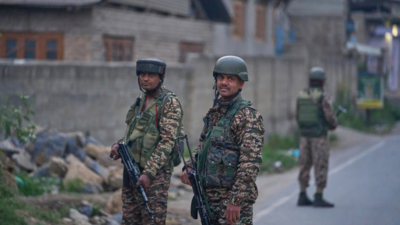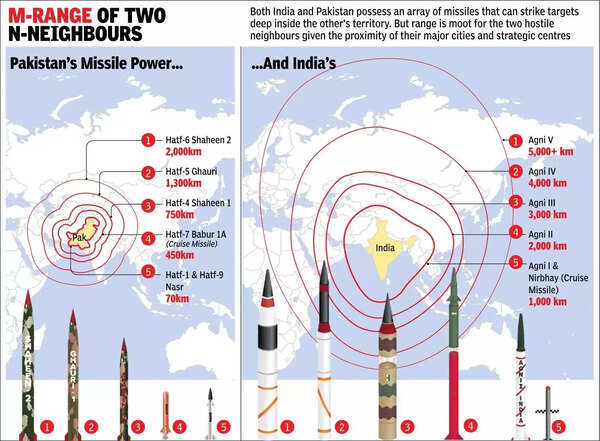
Indian para-military force soldiers stand guard at Pampore in Kashmir. (AP photo)
India’s measured and proportionate response without crossing the airspace, along with the fact that there is no direct military-to-military combat yet, should preclude any threat of nuclear escalation, assuming Pakistan will behave sanely. Islamabad has called the Indian strikes on terrorist camps in PoK and Pakistan Punjab a violation of its sovereignty, but its tactical or non-strategic tactical nuclear weapons have always been seen as intended for use against a ground invasion and not against limited strikes against terrorists.Pakistan developed the nuclear-capable short-range HATF missile with a range of only 60-70 km to deter any Indian invasion. However, after India announced its decision to put the Indus Waters Treaty in abeyance, Pakistan responded by declaring it will respond to any attempt to divert water with “full force across the complete spectrum of national power”. This was seen as a use of nuclear threat, something which the UNSC warned against in the closed-door meeting on India-Pakistan tensions this week.

It was seen as serious escalation by a country which doesn’t have a no-first use policy and has said in the past that one of the thresholds for the use of its nuclear arsenal is economic strangling, including “the stopping of the waters of the Indus river”.
Nuclear expert Hans Kristensen said he didn’t see a direct threat of nuclear escalation as the level of hostilities is still relatively low and India’s Cold Start doctrine is about an overwhelming military invasion of territory, which is not yet the situation here.However, he warned that the risk in the days ahead is that the two sides continue to retaliate and escalate.“If that evolves into a direct military confrontation with strikes into each side’s territory against more important targets, then we could potentially see the nuclear danger increase,’’ said Kristensen, the director of the Nuclear Information Project and an expert on nuclear arsenals around the world.“With more than 160 nuclear weapons on each side, including shorter range systems, the potential consequences are immense. So, one would hope that causes the two sides to constrain their actions,’’ he added. Any military escalation between the nuclear-armed neighbours has always been a nightmare for the international community and this has reflected in the number of calls for restraint and de-escalation in the past few days.The Federation of American Scientists (FAS) has said in the past that Pakistan has kept its nuclear forces scattered at many locations across the country. According to a report by FAS earlier this year, Pakistan has 170 nuclear warheads as against India’s 180. US officials in the past have expressed concern about Pakistan’s development of tactical nuclear weapons and how these are susceptible to terrorist theft.
.png)
 German (DE)
German (DE)  English (US)
English (US)  Spanish (ES)
Spanish (ES)  French (FR)
French (FR)  Hindi (IN)
Hindi (IN)  Italian (IT)
Italian (IT)  Russian (RU)
Russian (RU)  4 hours ago
1
4 hours ago
1









Comments